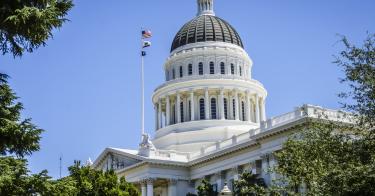Last year, Congress cut taxes for 9 out of 10 taxpayers. It will save the typical Californian about $1,400 this year.
But not everyone’s a fan. Gov. Jerry Brown went so far as to denounce the reform as “evil in the extreme.”
The governor’s biggest beef is with the new $10,000 cap on the state and local tax deduction (SALT). Political rhetoric over this change has left most Californians fearing they will wind up paying more in federal taxes.
But what’s missing from denunciations of the SALT cap is any mention of two accompanying reforms: lower tax rates and the doubling of the standard deduction. Those provisions assure that 89.6 percent of California taxpayers will see a tax cut or no change — even with the SALT cap. By this measure, California fares better than 20 other states. Indeed, three of the five congressional districts receiving the biggest tax cuts are in California.
Considering the rhetoric swirling around the tax cuts, it’s ironic that many of the areas getting the biggest tax relief — both as a percentage of income taxes paid and sheer volume of dollars — are represented by Democrats. The Republicans delivered the tax cuts, but Democrats are benefiting just as much, if not more.
The SALT cap moves the federal tax code toward the bipartisan goal of fairness and equity between taxpayers of similar incomes. Yes, a small fraction of Californians may see their taxes go up. But this is not because the federal tax system is somehow tilted against Democrats or California. It’s because California’s state taxes are too high. Blame Sacramento, not Washington.
Before the tax cuts, California’s high taxes were partially subsidized by out-of-state taxpayers. Some of California’s wealthiest taxpayers used their state tax deduction to reduce their federal tax bill by 40 percent.
That means that, when California raised the state’s highest-in-the-country top marginal income tax rate to 13.3 percent, high-income taxpayers paid only 60 cents for every dollar of additional California tax revenue. Washington was subsidizing bad state tax policy.
As if the state didn’t already tax its citizens enough, Sacramento just raised the gas tax by 40 percent, sticking California drivers with the second highest gas taxes in the country.One suspects that what worries Gov. Brown is not that the federal tax reforms will raise Californians’ taxes, but that the state’s highly progressive tax system will crumble without the federal subsidy he has come to rely on.
California’s top one percent of earners pay close to 50 percent of the state’s income tax. No doubt Gov. Brown understands that tax systems which rely on a small number of wealthy people to pay for most of government are unsustainable. When bled too much for too long, the rich either run out of money or run out of state.
Last year’s tax cuts made the federal tax code fairer and less burdensome. And the economy is growing as a result. Across the U.S., over 1 million jobs have been created since the tax cuts went into effect. Last month’s August’s 2.9 percent year-on-year wage increase was the largest since June of 2009. Unemployment is close to historic lows, and for the first time, there are more jobs available than people looking for them.
The Tax Cuts and Jobs Act lowered taxes and sparked economic growth. Californians are sharing in these benefits.
Many states have already taken the opportunity to enact parallel tax cuts. Instead of bad-mouthing the federal reforms, Gov. Brown should acknowledge that California’s high taxes are detrimental to the economy and encourage the Legislature to follow the example of Georgia, Idaho, Iowa, Missouri, and Utah, and lower state tax rates.
This piece originally appeared in the Orange County Register



